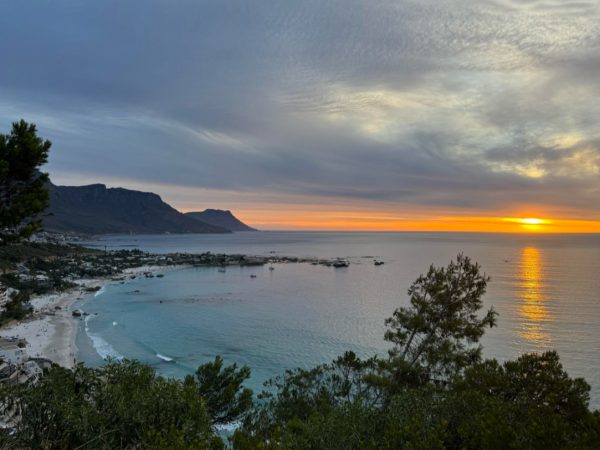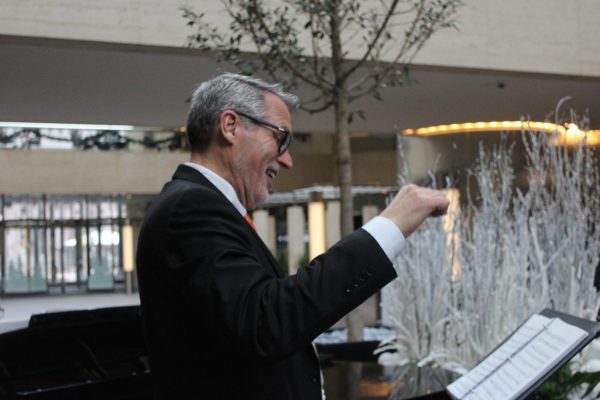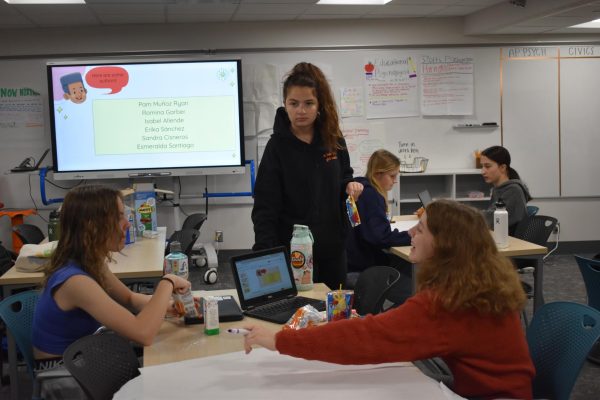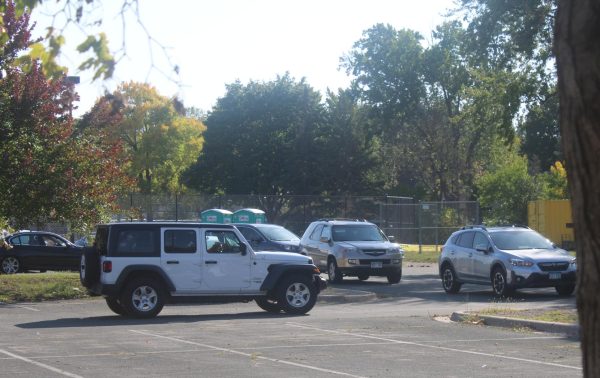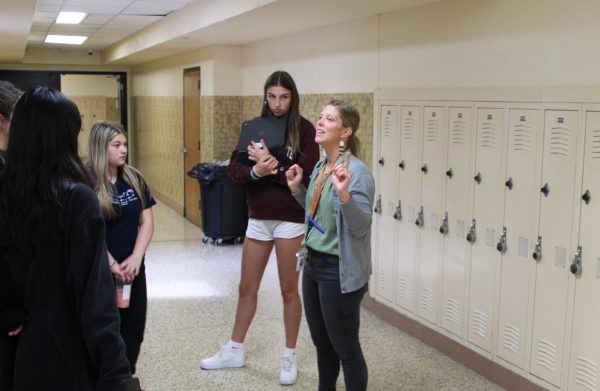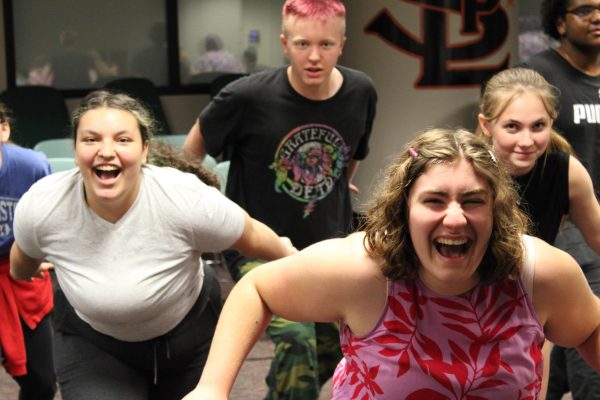14-day boundary waters trip proves unforgettable
Canoeing, camping and portaging from Lake 1 to Lake Superior
September 4, 2022
Over the summer, I spent 14 days canoeing, portaging and camping in the Boundary Waters Canoe Area Wilderness (BWCAW). The BWCAW is the wilderness that lies on the border of Minnesota and Canada. There are designated secluded campsites across the 1.1 million acre expanse. I went with a group of six other girls my age, and two college-aged group leaders. We took a route from Lake One to Lake Superior, which required us to weave in and out of the Boundary Waters in the Superior National Forest and into the Quetico Wilderness in Canada.
The Boundary Waters is made up of hundreds of lakes, separated by forest. To travel from lake to lake, campers paddle across lakes, walk through the forests on trails with either a canoe or a pack of gear on their shoulders. This is called portaging. Portages are measured in rods, which is the length of a canoe from the tip to the tail, around 17 feet. For reference, a one-mile portage is 320 rods. We had three canoes, five packs and lots of water bottles, so everyone’s hands were full.
I’d gone on trips like these before (a 10-day and a 5-day), so the first couple days felt similar. Everyone was very experienced, so the first part of the trip flew by. As we traveled, we got to know each other better. Most of us knew each other in some capacity, but a different kind of relationship is created when going through such a physically and mentally intense journey.
On night four, we couldn’t find any open campsites on Lake Mora, so we had to ask this young couple if we could share a campsite with them. It was a big campsite, so they let us stay and we kept our distance from them. When we initially saw them, we figured they were out for a weekend trip. Upon further investigation, we discovered they were pros disguised as newbies as they were finishing up a 31-day trip. After setting up, we went cliff jumping. It was my first time cliff jumping, and I loved it. I think that because it was one of our first times doing something so fun as a group, that experience was instrumental in bringing us together.
The next day was when things started getting interesting. We had been planning on paddling down nine miles of Cross River, which we had read online was canoe accessible. But the river was rapids the entire way, and it was in no way possible for us to pass through it. So we had three options: we could either paddle up and around the river, adding an extra day to our trip, have the people from the outfitter drive us five miles down the road to the drop point we wanted to get to, or portage on the side of the road to get there. We decided to have the people from the outfitter bring our canoes to the drop point, and we would hike with our packs only. This way, we could count the rods and do it safely. Unfortunately, an immediate problem arose.
As we started walking down the road out of the outfitter, a strap on our very stuffed food pack nearly entirely ripped off of the pack. Our group leaders ran back to the outfitter, and came back with two surprises — a new pack and a truck. We had a very relaxing ride down the road to our drop point of Gunflint Lake, where we thanked our driver for his kindness. We continued on and paddled across Gunflint Lake, North Lake and South Lake, then camped on Rose Lake.
We had our first layover the next day, where we slept in, tanned and swam across the lake to explore a nearby waterfall. The waterfall had a lot of rock ledges and fallen trees going across it, so we were able to climb through it and fully indulge in its beauty. The scene was engulfed in trees with the sun peaking through in streaks, making it seem like we were in an enchanted forest. It was truly one of the most magical moments of my life.
We had some exhausting days, one day we ended up going the wrong way because of a poorly marked trail resulting in our longest portage yet — 400 rods. The remainder of the trip went relatively smoothly, until day 12. We started the day with a mile portage, which we didn’t expect to be too hard — we were wrong. The entire trail was overgrown and at least 20 trees had fallen across the trail. Most of them we were able to step over (which was no easy task), but some were so high up that it took three people to get the canoe over the trunk. To add insult to injury, it was probably the buggiest portage we had during the entire trip.
Needless to say, we were all tired and angry by the end of this portage. But, because that was the first portage of the day, we still had an entire day of paddling ahead of us — especially considering that we were paddling down Pigeon River. A river that we had been told would take us 12 hours but turned into a ‘white water canoeing’ adventure. Once we finally made it across, we set up camp. But, our day was still not done. Nearly every 14-day boundary waters trip that goes through my program does the Grand Portage. The Grand Portage is around nine miles long (2880 rods) and is the longest portage in Minnesota. Our first trek down the Grand Portage wasn’t that bad — it was the walk back though that killed us. Exhausted from the extremely taxing day, our spirits were lifted by ramen noodles for dinner, and our final night sleeping in our tent.
The next morning we packed up camp and headed out around 4 a.m. Equipped with our headlamps, we hiked with our packs until we were reunited with our canoes we ditched the other day, luckily in the same spot we had left them. We split into three groups, and went out with around 20 minutes in between each group. The final stretch of the Grand Portage was definitely a challenge. There was a point where there was a very muddy uphill that made me slip and fall with the canoe on my shoulders. My group was in the back, so we were the last ones to finish. I emerged from the woods with the canoe on my shoulders, to see everyone cheering us on as we finished the legendary Grand Portage. We celebrated, took pictures, and discussed the discrepancies in others’ descriptions of the trail. We had heard all of these horror stories about how awful the GP is, but by the end we all agreed that we’d do it again if we had to.
After completing the Grand Portage, we were driven back to the cities, where we parted ways and returned to the real world. After being with the same six people for the past two weeks, I had some major culture shock once I got home. The transition was hard, but reminiscing about the trip made me feel so lucky that I got to experience everything I did with such amazing people in one of the most beautiful places in the world. Overall, we paddled 121 miles, portaged 8,776 rods and made countless memories that I will never forget.









